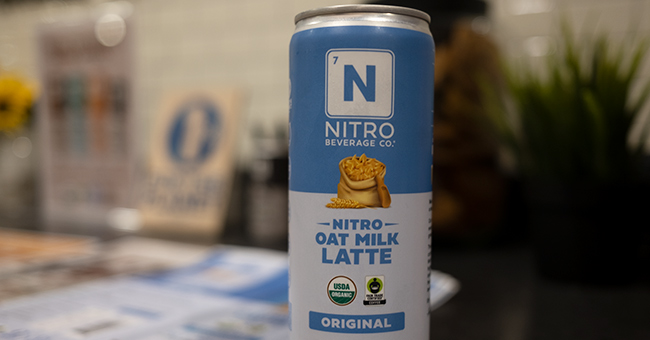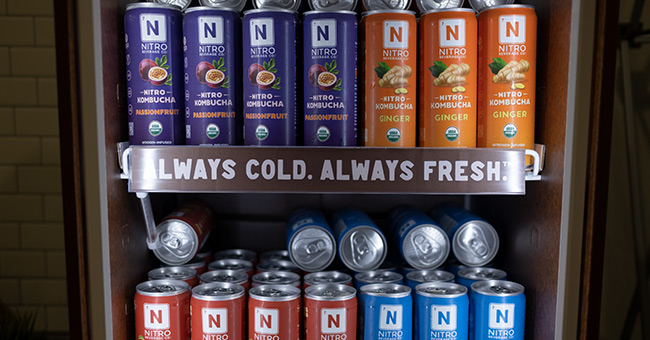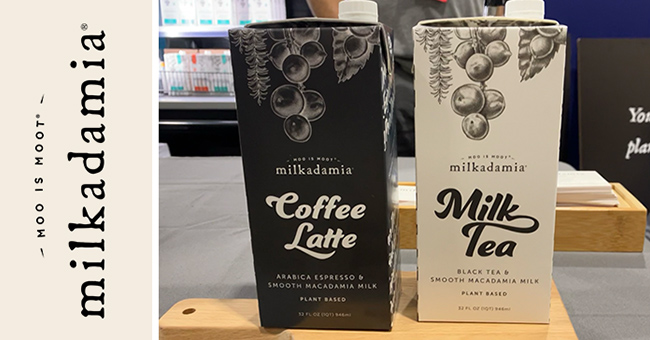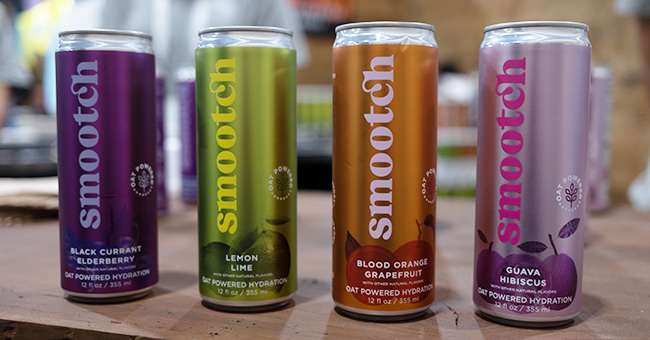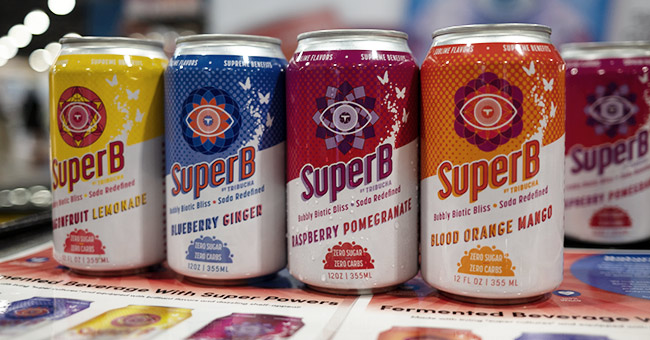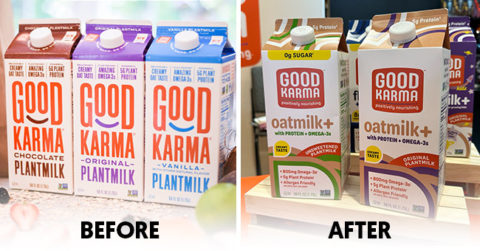RTD Latte Landscape Continues To Grow
Both coffee companies and other beverage makers were sending the message at Expo East that there is room for more RTDs lattes in the refrigerated aisle. New Jersey-based Nitro Beverage Company always had the ambition to expand beyond its core line of canned nitro cold brew in 12 oz cans, which have built a presence in natural retailers like Whole Foods in the Mid-Atlantic and Northeast. Those products have built sufficient scale and momentum to power a pair of innovations that debuted at Expo: an Oat Milk Latte RTD and a four-SKU line of nitro kombuchas: Ginger, Blueberry Lavender, Passionfruit and seasonal flavor Apple Spice.
For the former, the Asbury Park-based company followed a similar path as other coffee brands seeking to enter the RTD market; dissatisfied with their oat milk options, they began formulating their recipe that avoided use of oils, gums or preservatives. The result is Nitro’s Oat Milk Latte, available in a single Original flavor and coming in at 90 calories and 120mg of caffeine per 12 oz slim can. The product is currently being tested in the Northeast through existing accounts.
Entering the refrigerated kombucha set, however, represents a new and different challenge for Nitro. While the 12 oz can format is frequently associated with shelf-stable kombucha, Nitro’s cold-chain product ticks the boxes for raw and unpasteurized, as well as organic and relatively low sugar (7 grams per can). The line is entering the Northeast through Whole Foods and other retailers this fall, with the expectation that strong feedback can fuel further exploration into the broader nitro-infused beverage space: think sodas, lemonades or teas.
“When we started the company back in 2016, we were doing kegs and distributing to offices with kombucha, coffee, teas and lattes all on tap,” said CEO and co-founder Ali Mohamed. “When we moved into RTDs, we couldn’t jump into everything at once. We started with black cold brew and had plans to get the kombucha in shortly after but COVID hit and set innovation back little bit.”
Alternative milk maker Milkadamia is leveraging its line of dairy-free creamers and stepping into the RTD coffee business. At Expo East, the nut-based dairy company previewed prototypes for its two new products, Coffee Latte and Milk Tea, at the show. The move into RTDs has been part of Milkadamia’s plan for a while, CEO Jim Richards told BevNET, and the brand hopes the Milk Tea SKU can cater to Gen Z consumers who love boba tea. The nut milk company’s two new products will begin to manufacture in six weeks and initially will be available in 32 oz. cartons but the company is hoping to eventually branch into smaller sizes once demand ramps up.
Even bottled water brands are seeing an opportunity in RTD coffee. Hawaiian volcanic water maker Waiakea has been quietly leaning into coffee in recent years, first by launching a line of bagged, organic, island-grown coffee and now with the forthcoming move into RTD drinks. Rather than starting with a black coffee, the brand is stepping into canned coffee with two nitro lattes – Polynesian Vanilla and Mauna Mocha – in 11 oz. cans made with cold brew, cream and sustainably grown, organic cane sugar. The new RTDs are expected to hit stores in Q1 2023.
Amidst the aforementioned product extensions, there was still innovation to be found from one of the RTD cold brew category’s pioneers at Expo East: RISE Brewing Company showcased its newest flavor, Salted Caramel Nitro Oat Milk Latte.
Smootch’s ‘Oat Milk Hydration’ Powers Regenerative-Ag Dreams
As NOSH readers already know, there’s plenty of interest in products made from upcycled ingredients or powered by regenerative agriculture. Despite that enthusiasm, attempts to convert those resources into viable, scalable CPG businesses have seen mixed results. Could the answer be a sports drink?
For New Jersey-based startup Smootch, it’s a shot worth taking. Proudly dubbing itself an “oat powered hydration” drink, the brand’s four-SKU line — Black Currant Elderberry, Lemon Lime, Blood Orange Grapefruit and Guava Hibiscus — uses a proprietary base liquid made from oats grown on its regenerative partner farm in Maine. As it began to explore how to build a business based around the crop, parent company Farmalogical understandably thought oat milk would be the answer. But amidst a crowded market, Smootch takes things in a different direction, targeting better-for-you hydration and athletic occasions.
Each 12 oz. can comes in at 100 calories, with 19 grams of added sugar from organic clover honey and organic lemon juice, plus vitamin C and zinc.
As with similar past upcycling ventures, the idea is for Smootch to help open the market for more regeneratively grown products in the future; yellow field peas and buckwheat were both floated as potential sources for exploration. However, the immediate focus is finding an audience for Smootch, which will retail for $2.99 per can. As for the name, it’s a play on “smooth clean energy,” despite the drink being caffeine free.
Tribucha Looks Beyond Booch with SuperB
Like just about every other brand in the category, North Carolina-based Tribucha is looking beyond kombucha’s borders to expand its presence across the market. Yet the fermentation specialists believe that their newest release — SuperB, dubbed a “fermented beverage with super powers” on sell sheets at Expo East — is truly something special.
Whereas modern kombucha production is informed by centuries of tradition, Tribucha looked toward modern science to develop their first line extension. Working closely with a New York-based lab focused on experimenting with new cultures, Tribucha developed SuperB around a combination of five different cultures. The final product delivers a drinking experience similar to kombucha – lightly carbonated and sweetened with organic fruit juice and a touch of monk fruit – but the unique yeast-free fermentation process means the drink can’t produce alcohol and is naturally shelf-stable for 18-months. Zero sugar is also achieved through fermentation, and it’s caffeine-free, zero calories and carb-free.
While Tribucha’s core family of small-batch organic booch continues to move, reps at the brand’s booth noted that almost half (44%) of consumers who try kombucha once don’t come back. With fermentation science continuing to make strides in exploring new cultures and understanding how to use them, taking the opportunity to work directly with scientists (via licensing agreement) was the right move for the brand.
The 12 oz. cans themselves feature the same eye for artistic detail found in Tribucha’s kombuchas. Each SuperB flavor — Blueberry Ginger, Dragonfruit Lemonade, Raspberry Pomegranate and Blood Orange Mango — features a different color band and unique logo across the top of the can, with callouts for “bubbly biotic bliss” and “soda redefined” underneath. The product entered Publix and Harris Teeter stores at the beginning of this year.
Good Karma Repositioning Plant-Milk Line
Alt-dairy brand Good Karma is renaming its Plant-Milk line “Oatmilk +” as part of a wider packaging change.
Originally launched in 2021 and made of a combination of oat milk, pea protein and flax oils, Plantmilk represented the company’s biggest foray beyond its flagship line of flax milks. The resulting product had the creamy texture of oat milk with added protein and omega-3’s and zero grams of sugar.
However, the name didn’t clearly convey what was in the carton, with the generic term of “plant-milk” confusing some shoppers. Additionally, a brand representative at Expo East told BevNET, the line didn’t capitalize enough on the consumer awareness of, and interest in, oat milk.
The new name will hopefully highlight the base of the alt-milk, while differentiating it with more nutritional attributes, they said
